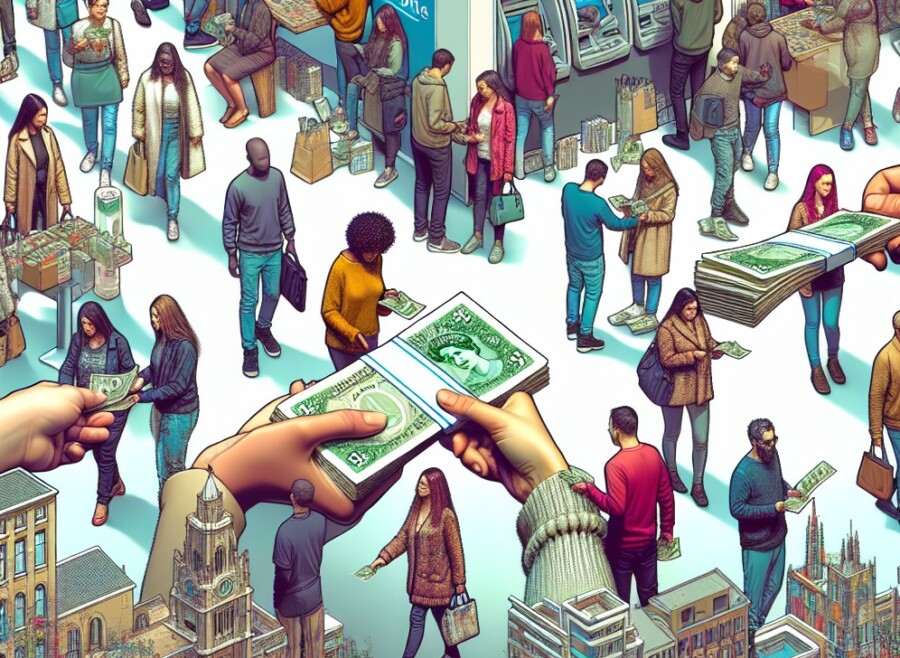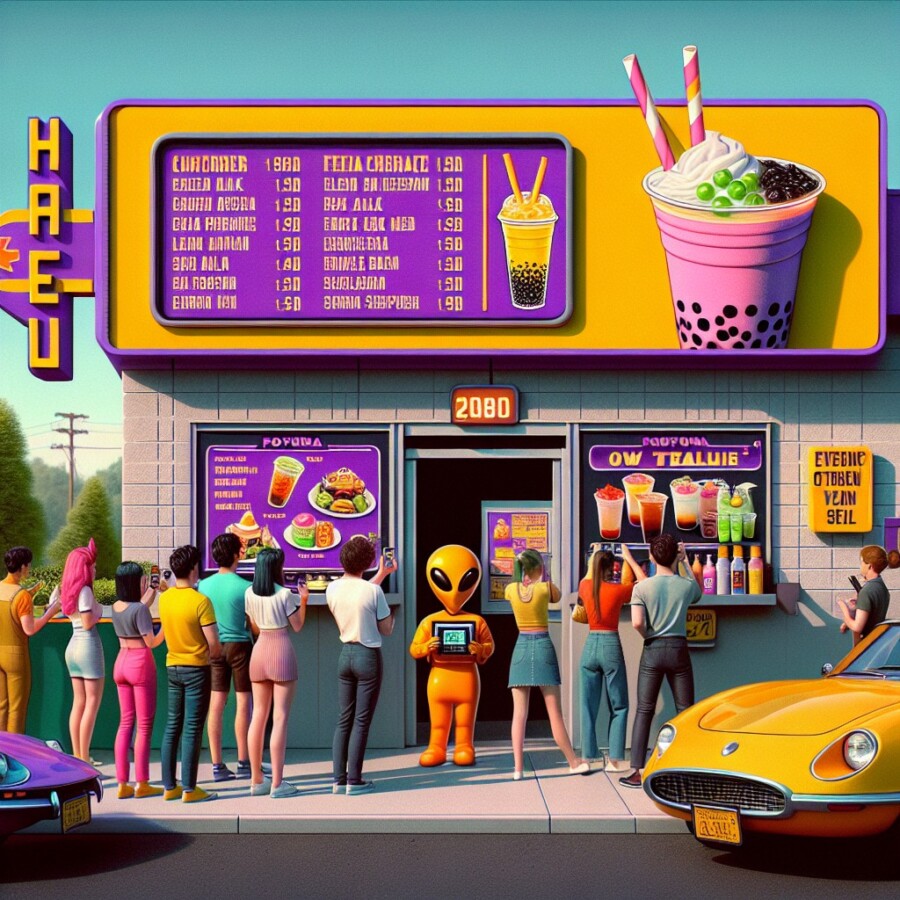People in the UK are using money you can touch, like coins and paper bills, more than before. This is the first time in ten years that this has happened. They are doing this because things cost more and they want to be careful with their money. When people were sick a lot, they didn’t use this kind of money much. But now, they are using it again. Shops have to pay more money when people buy things with cards, and they don’t like that.
There are new rules to help people get to money they can touch. These rules say that banks have to make sure people can find money near them. Some places where you can get money are closing, and this is hard for people who live where there are not many people. The new rules want to make sure people can still get money without it being too hard or costing too much. Even though people are using money they can touch right now, they might use it less later when things get easier with money. But it’s still important that people can get to money they can touch, especially if they really need it.
Original news source: Shopping with cash rises for first time in a decade (BBC)
Listen:
Slow
Normal
Fast
Vocabulary:
| 1 | money | Something you use to buy things |
| 2 | touch | To feel something with your hands |
| 3 | coins | Round pieces of metal that you can use to buy things |
| 4 | paper bills | Flat pieces of paper that you can use to buy things |
| 5 | cost | How much something costs |
| 6 | sick | Not feeling well |
| 7 | shops | Places where you can buy things |
| 8 | cards | Small plastic cards that you can use to buy things |
| 9 | rules | Instructions that tell you what you can and can’t do |
| 10 | banks | Places where you keep your money and can get more if you need it |
Group or Classroom Activities
Warm-up Activities:
– Charades
Instructions: Divide the class into two teams. One student from each team will come to the front of the class and act out a word or phrase related to the article, without speaking. The rest of the class must guess what they are acting out. The team that guesses correctly gets a point. Continue until all students have had a turn or until time runs out. The team with the most points wins.
– News Summary
Instructions: In pairs or small groups, students will take turns summarizing the main points of the article to their partner/group. They can only use a certain number of words (e.g. 10-15) to summarize each point. After each summary, the partner/group must guess what the main point was. Rotate roles and continue until each student has had a turn.
– Opinion Poll
Instructions: In pairs or small groups, students will discuss their opinions on using cash versus using cards for payments. They should discuss the advantages and disadvantages of each method and come to a consensus within their group. Once they have reached a decision, each group will share their opinion with the class and explain their reasons.
– Vocabulary Pictionary
Instructions: Divide the class into two teams. One student from each team will come to the front of the class. The teacher will give them a word or phrase related to the article, and they must draw it on the board without using any letters or numbers. Their team must guess what they are drawing within a certain time limit (e.g. 1 minute). If their team guesses correctly, they get a point. Continue until all students have had a turn or until time runs out. The team with the most points wins.
– Future Predictions
Instructions: In pairs or small groups, students will discuss and make predictions about the future of using cash and cards for payments. They should consider factors such as technology advancements, convenience, and cultural changes. Each group will share their predictions with the class and explain their reasoning.
Comprehension Questions:
1. Why are people in the UK using coins and paper bills more than before?
2. When did people not use this kind of money much?
3. Why don’t shops like it when people buy things with cards?
4. What are the new rules about money?
5. Why is it hard for some people when places to get money are closing?
6. What do the new rules want to make sure of?
7. Why is it still important for people to be able to get money they can touch?
Go to answers ⇩
Listen and Fill in the Gaps:
People in the UK are using money you can touch, like coins and paper (1)______, more than before. This is the (2)______ time in ten years that this has happened. They are doing this because things cost more and they want to be careful with their money. When people were sick a lot, they didn’t use this (3)______ of money much. But now, they are using it again. Shops have to pay more money when people buy things with cards, and they don’t like that.
There are new rules to (4)______ people get to money they can touch. These rules say that banks have to make sure people can find money near them. Some (5)______ where you can get money are closing, and this is hard for people who (6)______ where there are not many people. The new rules want to make sure people can still get money without it being too hard or costing too much. Even though people are using (7)______ they can touch right now, they might use it less later when things get easier with money. But it’s still (8)______ that people can get to money they can touch, especially if they really need it.
Go to answers ⇩
Discussion Questions:
Students can ask a partner these questions, or discuss them as a group.
1. What is money you can touch?
2. How would you feel if you had to pay more money when you buy things with a card?
3. Do you like using coins and paper bills? Why or why not?
4. Do you think it’s important to have money you can touch? Why or why not?
5. What are the new rules for getting money you can touch?
6. How do you think people feel when places where they can get money are closing?
7. Do you think it’s fair that some people have a hard time getting money because there are not many people where they live? Why or why not?
8. How do you think things will be different when it gets easier with money?
9. Do you think it’s important for people to be able to get money they can touch? Why or why not?
10. How do you think people feel when they really need money but can’t get it?
11. What are some things you can buy with money you can touch?
12. How do you think people will feel if they can’t use money they can touch anymore?
Individual Activities
Vocabulary Meanings:
Match each word to its meaning.
Words:
1. money
2. touch
3. coins
4. paper bills
5. cost
6. sick
7. shops
8. cards
9. rules
10. banks
Meanings:
(A) Instructions that tell you what you can and can’t do
(B) Round pieces of metal that you can use to buy things
(C) How much something costs
(D) Something you use to buy things
(E) Small plastic cards that you can use to buy things
(F) Places where you keep your money and can get more if you need it
(G) To feel something with your hands
(H) Flat pieces of paper that you can use to buy things
(I) Not feeling well
(J) Places where you can buy things
Go to answers ⇩
Multiple Choice Questions:
1. Why are people in the UK using money you can touch?
(a) They want to buy more things online.
(b) They don’t like using cards.
(c) Things cost more and they want to be careful with their money.
(d) They want to save money.
2. When did people in the UK start using money you can touch again?
(a) In the past year.
(b) In the past month.
(c) In the past ten years.
(d) In the past week.
3. Why don’t shops like it when people buy things with cards?
(a) They have to pay more money.
(b) They don’t have enough cards.
(c) They don’t like the color of the cards.
(d) They don’t trust people who use cards.
4. What do the new rules say about banks?
(a) Banks have to close all their branches.
(b) Banks have to make sure people can find money near them.
(c) Banks have to stop giving people money.
(d) Banks have to make people use cards.
5. Why are some places where you can get money closing?
(a) Because people don’t like going there.
(b) Because the new rules want to make it harder for people to get money.
(c) Because they want to sell more things.
(d) Because they don’t have enough money.
6. What do the new rules want to make sure of?
(a) People can’t get money anymore.
(b) People can still get money without it being too hard or costing too much.
(c) People have to use cards all the time.
(d) People can only use coins to buy things.
7. Will people use money they can touch less in the future?
(a) No, they will always use money they can touch.
(b) Yes, because they don’t like money they can touch.
(c) Yes, when things get easier with money.
(d) No, because they don’t have any money.
8. Why is it important that people can get to money they can touch?
(a) Because they want to buy more things online.
(b) Because they don’t like using cards.
(c) Because they want to save money.
(d) Especially if they really need it.
Go to answers ⇩
True or False Questions:
1. This is the first time in ten years that people are using money you can touch.
2. In the UK, people are using coins and paper bills more than before.
3. The new rules want to make sure people can still get money without it being too easy or costing too little.
4. There are new rules to help people get to money they can touch.
5. People are using digital money because things cost less and they want to be carefree with their money.
6. Some places where you can get money are thriving, and this is beneficial for people who live where there are not many people.
7. Shops have to pay less money when people buy things with cards, and they don’t like that.
8. When people were sick a lot, they didn’t use this kind of money much.
Go to answers ⇩
Write a Summary:
Write a summary of this news article in two sentences.
Check your writing now with the best free AI for English writing!
Writing Questions:
Answer the following questions. Write as much as you can for each answer.
Check your answers with our free English writing assistant!
1. Why are people in the UK using coins and paper bills more than before?
2. When did people not use this kind of money a lot?
3. Why don’t shops like it when people buy things with cards?
4. What are the new rules for banks?
5. Why is it important for people to be able to get money they can touch?
Answers
Comprehension Question Answers:
1. Why are people in the UK using coins and paper bills more than before?
Because things cost more and they want to be careful with their money.
2. When did people not use this kind of money much?
When they were sick a lot.
3. Why don’t shops like it when people buy things with cards?
Because they have to pay more money when people use cards.
4. What are the new rules about money?
The new rules say that banks have to make sure people can find money near them.
5. Why is it hard for some people when places to get money are closing?
Because they live where there are not many people.
6. What do the new rules want to make sure of?
The new rules want to make sure people can still get money without it being too hard or costing too much.
7. Why is it still important for people to be able to get money they can touch?
Because they might really need it, especially when things get easier with money.
Go back to questions ⇧
Listen and Fill in the Gaps Answers:
(1) bills
(2) first
(3) kind
(4) help
(5) places
(6) live
(7) money
(8) important
Go back to questions ⇧
Vocabulary Meanings Answers:
1. money
Answer: (D) Something you use to buy things
2. touch
Answer: (G) To feel something with your hands
3. coins
Answer: (B) Round pieces of metal that you can use to buy things
4. paper bills
Answer: (H) Flat pieces of paper that you can use to buy things
5. cost
Answer: (C) How much something costs
6. sick
Answer: (I) Not feeling well
7. shops
Answer: (J) Places where you can buy things
8. cards
Answer: (E) Small plastic cards that you can use to buy things
9. rules
Answer: (A) Instructions that tell you what you can and can’t do
10. banks
Answer: (F) Places where you keep your money and can get more if you need it
Go back to questions ⇧
Multiple Choice Answers:
1. Why are people in the UK using money you can touch?
Answer: (c) Things cost more and they want to be careful with their money.
2. When did people in the UK start using money you can touch again?
Answer: (a) In the past year.
3. Why don’t shops like it when people buy things with cards?
Answer: (a) They have to pay more money.
4. What do the new rules say about banks?
Answer: (b) Banks have to make sure people can find money near them.
5. Why are some places where you can get money closing?
Answer: (d) Because they don’t have enough money.
6. What do the new rules want to make sure of?
Answer: (b) People can still get money without it being too hard or costing too much.
7. Will people use money they can touch less in the future?
Answer: (c) Yes, when things get easier with money.
8. Why is it important that people can get to money they can touch?
Answer: (d) Especially if they really need it.
Go back to questions ⇧
True or False Answers:
1. This is the first time in ten years that people are using money you can touch. (Answer: True)
2. In the UK, people are using coins and paper bills more than before. (Answer: True)
3. The new rules want to make sure people can still get money without it being too easy or costing too little. (Answer: False)
4. There are new rules to help people get to money they can touch. (Answer: True)
5. People are using digital money because things cost less and they want to be carefree with their money. (Answer: False)
6. Some places where you can get money are thriving, and this is beneficial for people who live where there are not many people. (Answer: False)
7. Shops have to pay less money when people buy things with cards, and they don’t like that. (Answer: False)
8. When people were sick a lot, they didn’t use this kind of money much. (Answer: True)
Go back to questions ⇧















